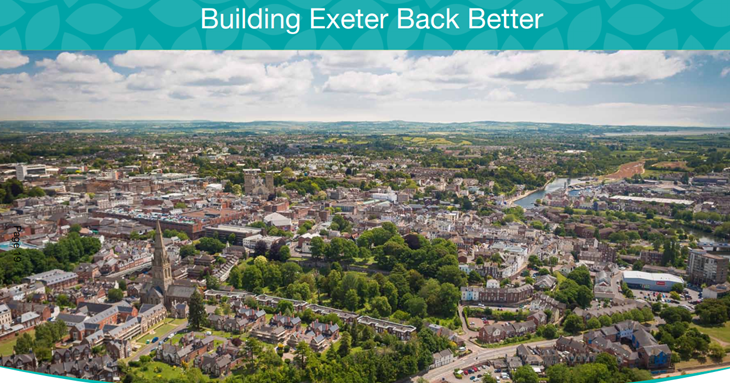Building Exeter Back Better: a collaborative recovery plan for Exeter
Published: 27 October 2020

A plan to support Exeter’s recovery from Covid-19 and the realisation of the city’s 2040 vision is set to be discussed by councillors.
Over the past few months the city’s key organisations and businesses have worked together to develop the recovery plan.
It was endorsed by the Liveable Exeter Place Board earlier this month, confirming key partner support and collaboration to drive forward a successful recovery for the city.
Formal discussion of the plan will now take place by the City Council’s Executive on 3 November.
Building Back Exeter Better takes a placed-based approach and has been developed in collaboration with a wide range of public and private sector stakeholders. It seeks to secure the city’s recovery from the effects of the Covid-19 pandemic.
It has identified a range of projects that would require major investment from a variety of sources, including:
- The establishment of a revolving carbon reduction fund - £200m has been identified as the sum required, relating to the Net Zero Exeter 2030 Plan. That Plan has shown a variety of programmes that would need to be delivered at pace should the city wish to meet the ambition of a net zero city
- A multi-purpose venue, and projects to support the city centre as a destination - various reports have already been considered by Executive on the potential for a multi-purpose venue and the transformation of the South Street and Corn Exchange area of the city centre. Likewise Executive has had sight of plans for the redevelopment of City Point and the wider development of Paris Street/Sidwell Street area of the city centre
- Transport - the City Council has been working with Devon County Council on the Exeter Transport Strategy and the National Infrastructure Commission. £100m of transport infrastructure has been identified as required over the next five years to support the city, with at least 50% of funding required from government
The recovery plan identifies three key interventions to support Covid-19 recovery and also deliver the city’s 2040 vision for a carbon neutral, sustainable, healthy and active city:
- Investment in Exeter City Centre – this is seen as key to ensuring Exeter remains a vibrant place and a major regional destination
- A bespoke digital training and skills package for Exeter - the pandemic has highlighted the disparity that exists in Exeter around digital skills
- Investment to support WellBeing Exeter – long term funding is seen as crucial after it was instrumental in coordinating and facilitating the city’s response to the pandemic

Council Leader Phil Bialyk, pictured above, said with its track record of growth, an outstanding education sector and strong record of collaboration, Exeter starts this period of recovery on firm foundations.
He said: “Exeter City Council is here to support the residents and business of Exeter. We are working together with local partners to ensure that we can all continue to enjoy the things that living in Exeter brings.
“The work undertaken by the recovery groups, supported by the Liveable Exeter Place Board, will ensure that we’re in a good position to promote the work of the city and make others aware of what we can deliver to support recovery. I am confident that by working together we can pull through this and be a leading city in supporting the global recovery from the impacts of Covid-19.”

Sir Steve Smith, Chair of the Liveable Exeter Place Board, pictured above, said: “This recovery plan is rooted in the locality and is the result of efforts by key public sector agencies, business and community stakeholders capable of providing a supportive, joined up framework for the city.
“A coordinated effort, informed by local knowledge, will be key to minimising economic damage and shaping the city’s recovery. It is a testament to Exeter’s spirit of collaboration that so many organisations have come together to work on this plan.
“I feel it demonstrates the value of continued investment in Exeter as an engine for growth and recovery in the South West and look forward to engaging partners and government bodies in discussions on funding to support the initiatives we have identified.”
The recovery plan looks at seven key areas - city centre, business support, community and wellbeing, construction and development, education, transport, visitor economy (culture and tourism) - that have been most keenly effected by the pandemic.
It summarises what has already been done in response to Covid-19, while examining how to take forward emerging opportunities, both long and short term, to support both city and regional recovery.
Each of the key areas has its own recovery group made up of industry professionals, businesses and public sector organisations who have come together to share knowledge and support a collective recovery strategy. Each group is chaired by a member of the Liveable Exeter board.
The Liveable Exeter Place Board is involved in the Council’s recovery planning because it brings together the city’s leading public and private sector organisations, and offers the opportunity to collaboratively and proactively plan for the city’s future – with the aim of delivering on our 2040 vision and making the city an exceptional place to live, work, study and visit.
All recommendations made in the recovery plan will be reported to the Executive of the City Council for consideration on 3 November.
To view the recovery report click here: http://committees.exeter.gov.uk/documents/g6612/Public%20reports%20pack%2003rd-Nov-2020%2017.30%20Executive.pdf?T=10
